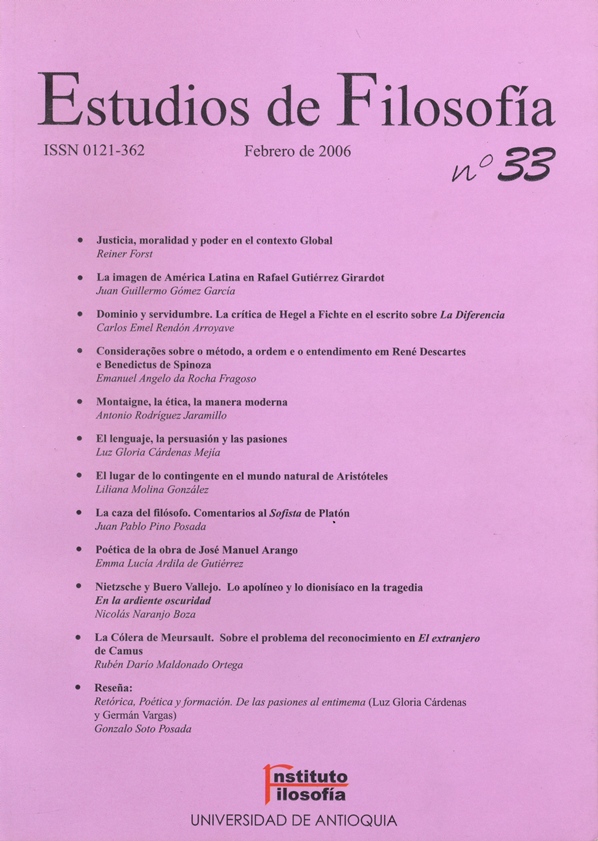Meursault's anger on the problem of recognition in The Stranger by A. Camus
DOI:
https://doi.org/10.17533/udea.ef.12838Keywords:
absurd, rebellion, indifference, innocence, liberty, recognisanceAbstract
Here the itinerary of the way in which Albert Camus, making use of the Analytic of the Absurd, faces the problem of Human Liberty in an open confrontation with the Rationalist Ontological Tradition, far which he uses the Literary Recourse as a ludico-didacticai mode of expression, particularly in the episode that tells of Mersault's anger at the end of his novel The Stranger. In the development of the said itinerary, the paper will show the correspondences between the ideas that an formulated tn The Myth of Syxiphus —where the Condition pertaining to Man it established in terms of a Display of the Drama of his Absurdity, and the work of turning those ideas into suggestive images for his own recreation and his better understanding, due to his recourse to the Literary. Then the closeness between The Stranger and The Myth of Sytiphus will have to be closely studied and in relation to the formulation of a Theory of Man that creates and becomes the base for a Theory of Rebellion, expressed os Fidelity ta the Absurd. It all tends to show the concordance between the fact that the Philosophical Intuitions of Camus were expressed in Literary Form, with his thought that the Absurd Man is a Creator par excellence.
Downloads
Downloads
Published
How to Cite
Issue
Section
Categories
License
Copyright (c) 2006 Rubén Darío Maldonado Ortega

This work is licensed under a Creative Commons Attribution-NonCommercial-ShareAlike 4.0 International License.
Authors who publish with this journal agree to the following terms:
1. The Author retains copyright in the Work, where the term "Work" shall include all digital objects that may result in subsequent electronic publication or distribution.
2. Upon acceptance of the Work, the author shall grant to the Publisher the right of first publication of the Work.
3. The Author shall grant to the Publisher a nonexclusive perpetual right and license to publish, archive, and make accessible the Work in whole or in part in all forms of media now or hereafter known under a Creative Commons Attribution-NoCommercia-ShareAlike (CC BY-NC-SA 4.0), or its equivalent, which, for the avoidance of doubt, allows others to copy, distribute, and transmit the Work under the following conditions: (a) Attribution: Other users must attribute the Work in the manner specified by the author as indicated on the journal Web site;(b) Noncommercial: Other users (including Publisher) may not use this Work for commercial purposes;
4. The Author is able to enter into separate, additional contractual arrangements for the nonexclusive distribution of the journal's published version of the Work (e.g., post it to an institutional repository or publish it in a book), as long as there is provided in the document an acknowledgement of its initial publication in this journal;
5. Authors are permitted, and Estudios de Filosofía promotes, to post online the preprint manuscript of the Work in institutional repositories or on their Websites prior to and during the submission process, as it can lead to productive exchanges, as well as earlier and greater citation of published work (see The Effect of Open Access). Any such posting made before acceptance and publication of the Work is expected be updated upon publication to include a reference to the Estudios de Filosofía's assigned URL to the Article and its final published version in Estudios de Filosofía.















